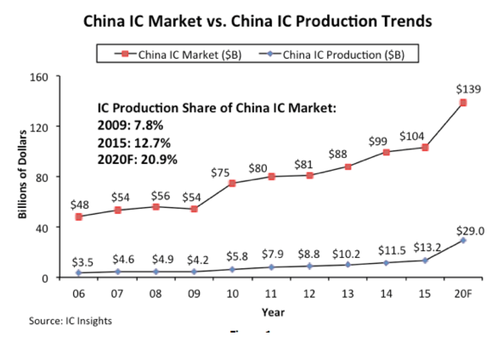
TAIPEI — China, which in dollar terms imports more semiconductors than oil, is likely to narrow its chip deficit by the end of this decade, according to market research firm IC Insights.
The world’s workshop, which assembles smartphones, tablets and PCs for everyone from Apple to ZTE, has been aiming to capture a bigger piece of the semiconductor business since the late 1990s. China will increase its share of total domestic chip consumption to 21 percent by 2020 compared with about 13 percent in 2015, IC Insights said.
“Over the past 20 years, China has become increasingly frustrated over the gap between its IC imports and indigenous IC production,” the market research company said in an email sent to EE Times.
China has aimed to build a strong domestic IC industry since 2014, just before the start of its 13th Five Year Plan that runs from 2015 through 2020, IC Insights said. This phase is supported by a huge war chest of cash earmarked for acquisition of semiconductor companies and their associated intellectual property, according to the US market researcher.

The cash will also provide additional funding to China’s existing IC producers such as Semiconductor Manufacturing International Corp. (SMIC) and HuaHong Grace Semiconductor, while helping to establish new chipmakers such as Sino King Technology and Fujian Jin Hua, according to IC Insights.
China’s effort to build its domestic chip industry comes amid a global wave of semiconductor mergers and acquisitions that’s been underway for two years. In 2015 alone, the value of semiconductor industry M&A deals exceeded $100 billion, and China’s been part of the activity.
China accounts for nearly $4 billion of the M&A activity since the beginning of 2014. The largest deal was the $2.4 billion acquisition of Fairchild Semiconductor International by China Resources Microelectronics and Hua Capital Management, announced in January this year.
Drama
China’s effort to get a leg up in the chip business has been marked by some drama. In the first quarter this year, the U.S. Department of Commerce slapped an export ban on U.S. IC suppliers’ shipments to China-based telecom giant ZTE after the company allegedly shipped telecommunications equipment to Iran while it was under trade sanctions by the U.S. The ban, if enacted, would have a devastating effect on ZTE’s telecom equipment sales including mobile phones, according to IC Insights. Thus far, the export ban has been postponed until August 30, 2016 pending further investigation by the U.S. Department of Commerce.
The announcement of export controls by the U.S. government sent shock waves through the Chinese government as well as China’s electronic system manufacturers, IC Insights said. Such potentially drastic measures taken by the U.S. government against such a large Chinese electronics company have bolstered the Chinese government’s resolve to make China more self-sufficient in IC component production, according to IC Insights.
----Form EE Times